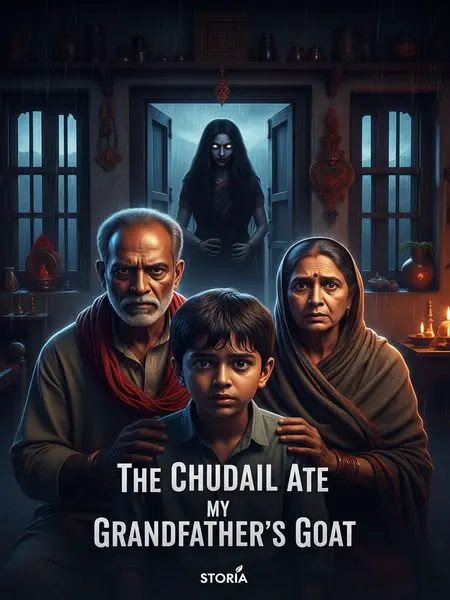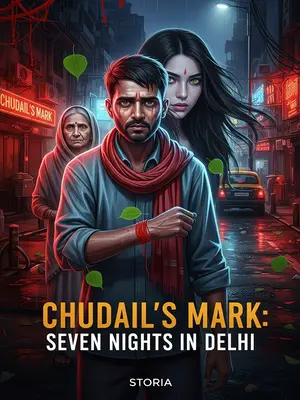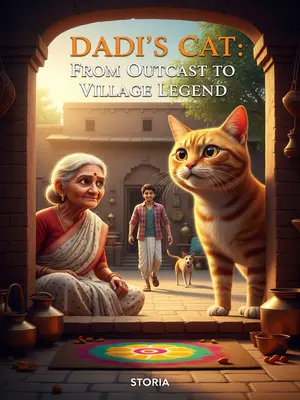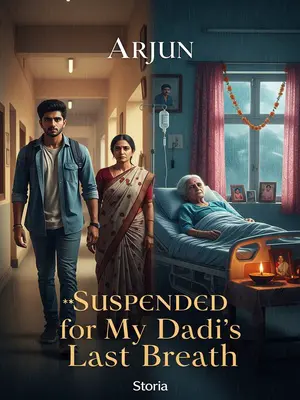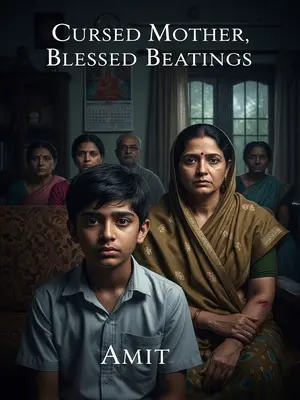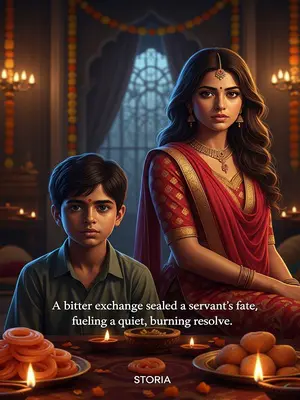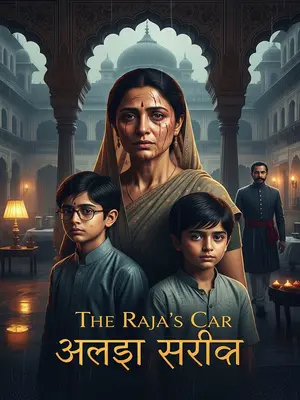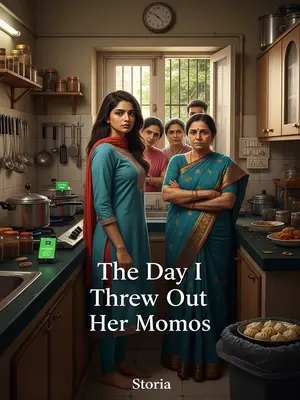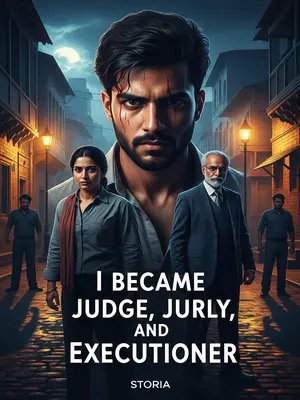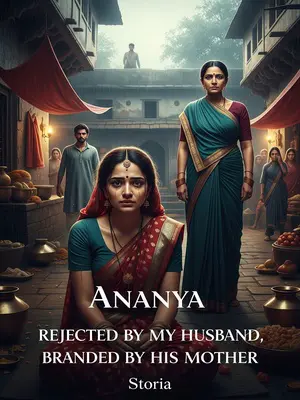Chapter 1: Blood on the Red-Oxide Floor
I was eight when Dadaji dragged the old mountain goat behind the cowshed and slit its throat. The smell of blood mixed with the biting winter air, and Dadi’s bangles clanged angrily as she stormed out, shouting—"That goat’s been here longer than you! Are you mad, killing it now? That goat’s already become a bhoot, I’m telling you!"
The memory never left me—the sharp, metallic tang in the air, Dadi’s finger wagging at Dadaji, her gold bangles clashing in outrage. Outside, the neem tree groaned in the cold wind, and somewhere the village dogs began howling, their cries joining Dadi’s protest. Even the tube light above the kitchen door flickered and buzzed, as if shuddering at her words.
Dadaji’s face was set like stone. He looked at her from behind his thick glasses, moustache twitching but eyes hard. His voice was flat, heavy as granite: "Someone’s coming tonight. We can’t let them go hungry."
A chill ran through the kitchen, his words settling like a curse. For a moment, his eyes seemed even smaller, mouth set in a thin, unyielding line. The hush that followed was thick, like the air before a storm, making me shiver.
I can’t remember when it truly started, but after that day, Dadaji seemed to withdraw—his warmth lost somewhere in the shadows.
Gone were the old jokes he’d tell over evening chai; instead, a coldness filled the house, the kind that seeps under the door in December. The kitchen, once lively with cricket arguments and onion price debates, now echoed only with the hiss of the pressure cooker.
Dadi, still fuming, stamped her feet, voice cracking: "You must be pagal! Our house is halfway up the hill and the road’s all snowed in. Kaun aayega at this hour?"
She snapped her dupatta in frustration, sending a puff of dust swirling from the storeroom floor. Her words bounced off the old beams, and even the neighbour’s rooster fell silent, as if listening in on the drama.
Dadaji ignored her, picking up the knife and beginning to skin the goat with a focus that was almost frightening. The blade scraped bone, each movement steady, cold. His kurta was already splattered, but he didn’t seem to notice. Outside, the sky faded to the pale blue of late winter, and in the verandah’s corner, the brass bell Dadi rang each morning trembled with the wind.
Dadi tried to snatch the knife away, her hands trembling as she reached for the blade, gold bangles jangling. She looked at Dadaji, eyes pleading, but he wouldn’t even meet her gaze—his arms were still strong from years in the fields. She let out a helpless sigh, voice wavering with a mixture of anger and grief.
He shoved her aside, nearly knocking her over. Coldly, he ordered, "Ja, paani garam kar le. Raat hone se pehle mutton pakna chahiye."
She steadied herself against the kitchen counter, muttering about stubborn men and bad omens. The knife flashed again, blood drip-dripping onto the red-oxide floor, mixing with memories of a hundred family meals. For a second, only the drip-drip of blood on the red-oxide floor and the distant static of the radio filled the silence.
Dadi’s anger softened, replaced by worry. "Old man, this goat is unlucky. We can’t eat it. Please—bury it like a person, give it a name, carve a stone, beg forgiveness. Only then will this be over."
She wiped her eyes with her pallu, voice quivering with a sadness only grandmothers know. Her gaze lingered on the goat’s body, hoping perhaps that the right prayer might save their home. Above the godrej almirah, the clock ticked on, each second a warning that night was near.
Dadaji scowled, snapping, "Zinda rehna hai toh meri baat maan lo."
His voice cracked like a whip, echoing in the cramped kitchen. Dadi knew that tone—it was the same one he used when the tax collector came around, and there was no arguing with it.
He finished skinning the goat, hanging its pelt on the clothesline. When the wind blew, the air filled with the heavy stench of blood and animal.
The courtyard, usually scented with ginger and cloves, now reeked of raw meat. Even the stray cat that haunted our doorstep kept away, green eyes wide with suspicion.
Dadi sighed, knowing she couldn’t change his mind. She looked up and whispered a prayer to Mata Rani, her fingers tracing the beads of her mangalsutra as if each prayer could build a wall between us and the darkness outside. The radio in the next room sputtered out an old Kishore Kumar song, the melody thin against the weight of night.
She led me into the storeroom to boil water. Gripping my shoulders, she whispered, "Arjun, listen to Dadi. Tonight, not even one bite of mutton—not even a taste. If you behave, I’ll take you to the city for tandoori chicken and jalebi. Pakka."
She squatted by the old kerosene stove, eyes darting to the window. Her stomach rumbled but her resolve held. The thought of city tandoori and jalebi from Chandni Chowk’s halwai brought a flicker of hope to my heart.
I nodded, "I know, Dadi."
My voice was soft, barely above the pressure cooker’s hiss. My stomach grumbled, but Dadi’s stern look kept my mouth shut.
Seeing me agree, she relaxed a little. "Not even a sip of the soup, samjha?"
She pinched my cheek, her old habit, voice urgent—like she was warning me away from hot oil or the busy road.
I whispered, "Don’t worry, Dadi. I won’t eat or drink anything. That goat... when Dadaji killed it, it looked at him strange, like it was a person."
My words were shaky, softer than the stove’s whistle. Dadi’s grip on my shoulder tightened, and I could feel her heart racing, as if she too feared the goat’s stare.
She hugged me tight, her breath warm and scented with cardamom and fear. "Arjun, stay away from your Dadaji tonight."
Her fingers dug into my shoulders. She looked over her shoulder, half-expecting the goat’s ghost to appear from the shadows.
I nodded, loyalty to her, the safe smell of her sari, the trembling of her hands. She was my world.
Just then, Dadaji entered with half a bucket of mutton, kurta and face spattered with blood. He looked like a figure from a nightmare—his hands shaking, the floorboards creaking under his weight. The lamp above the stove flickered nervously.
"Paani garam ho gaya?" he asked, voice rough, urgency sharp enough to make the cat dart away.
Dadi forced a smile. "Ho gaya."
She wiped her hands on her sari, lips pressed tight. The pressure cooker hissed, drowning out the words neither wanted to say.
She lifted the lid, and a cloud of steam rose, filling the kitchen with the scent of boiled meat—comforting, but with a sharp, metallic edge. For a second, the steam fogged her glasses, hiding her worried eyes from me.
Dadaji dumped the mutton in. "Koi masala mat daalna," he ordered.
The words were strange in a kitchen where every dish was a riot of spices. Dadi’s hand hovered over the masala box, the lid cold and heavy.
"Namak bhi nahi?" she asked, disbelief making her voice squeak. She shook her head, baffled.
He nodded, jaw clenched. The room was silent except for the wall clock and a distant dog barking.
She muttered, "Bina namak kaun khata hai?" She stared at the bubbling stew, then glanced at me—one last warning not to touch a thing.
Dadaji just squinted and left for the verandah, his footsteps echoing, the door swinging shut with a long, rusty squeal. Outside, the cold pressed harder against the glass, making the house feel emptier.
Night fell, snow drifting into the yard. It was bitter cold. The hills were lost under white, the chill seeping into our bones. The power flickered; Dadi wrapped her shawl tighter, grumbling about the electricity board and old winters.
Dadi placed the cooked mutton in a steel basin. The aroma made my mouth water—steam curling like ghosts. I swallowed, tempted, until Dadi’s sharp eyes pinned me.
She snapped, "Arjun! Ek bhi niwala nahi!"
Her finger wagged, bangles jangling, her tone fierce enough to cow even Dadaji. I nodded, guilt flushing my cheeks.
I clutched my sweater, nodding harder, the wind rattling the windows. Somewhere, a crow cawed—a bad omen, Dadi would say.
Worried I’d sneak a bite, she dragged me outside. Dadaji stood there, smoking a bidi, smoke mixing with the mist and the tang of goat. Dadi’s hand was tight on mine.
She asked, "Suno, mutton toh ho gaya, par koi aaya kyun nahi ab tak?"
Her voice was wary, eyes fixed on the dark path to the village.
Dadaji took a slow puff. "Aa gaye hain."
He didn’t look away from the far end of the yard. A shiver ran through me, the hair on my arms standing up. Dadi’s grip on my hand was iron, as if she could protect me from whatever was coming.
